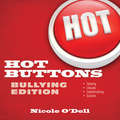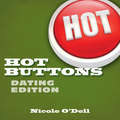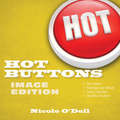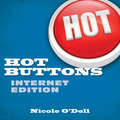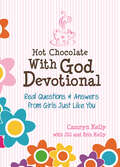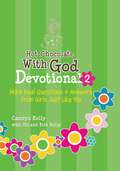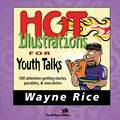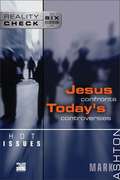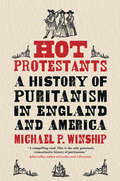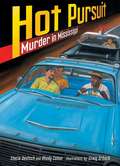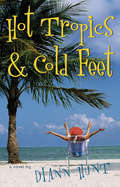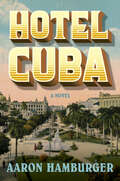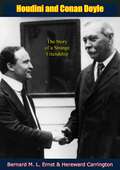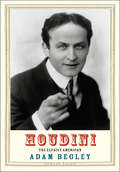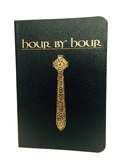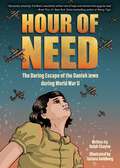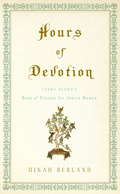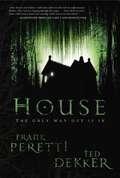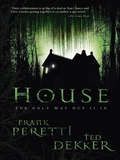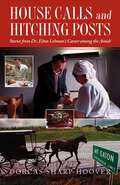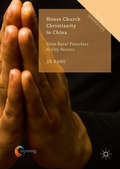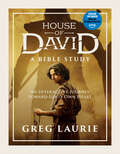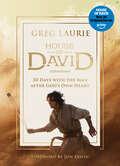- Table View
- List View
Hot Buttons Bullying Edition
by Nicole O'DellFrom dating to drugs, modesty to purity, morals to popularity, teens face all sorts of tough issues. How teens respond to these challenges will influence their future, possibly define their future, maybe even determine whether they have a future or not. Following four successful books in the uniquely packaged Hot Buttons Series, author, mom, and broadcaster, Nicole O'Dell now debuts another book on one of the most prevalent issues in the lives of today's teens: bullying. Parents can reach for this quick-reference resources to create healthy conversations with their teens about teasing, cliques and gangs, suicide, and more. Nicole's creative strategic scenarios, discussion questions, and Bible studies have and will continue to equip parents to proactively prepare their tweens and teens to respond to challenges with courage and grace.
Hot Buttons Dating Edition
by Nicole O'DellThe uniquely packaged Hot Buttons Series is an accessible, quick-reference resource that parents can use to equip their children to make the right decisions, even in the face of peer pressure and outside influences. More than just another how-to manual, Hot Button Dating edition offers practical real-life situations that parents can read and discuss with their preteens. Author, mom, and broadcaster, Nicole O'Dell provides short scenarios followed by three or four responses that a teen might choose in that particular situation. Parents are then encouraged to help their children explore the issue, ask questions, and discuss the options, so when a similar situation comes up in real life, the teens are already prepared to respond.
Hot Buttons Image Edition
by Nicole O'DellFrom dating to drugs, modesty to purity, morals to popularity, teens face all sorts of tough issues. How teens respond to these challenges will influence their future, possibly define their future, maybe even determine whether they have a future or not. Following four successful books in the uniquely packaged Hot Buttons Series, author, mom, and broadcaster, Nicole O'Dell now debuts another book on one of the most prevalent issues in the lives of today's teens: image. Parents can reach for this quick-reference resource to create healthy conversations with their teens about self esteem, piercings and tattoos, eating disorders, and trash talk. Nicole's creative strategic scenarios, discussion questions, and Bible studies have and will continue to equip parents to proactively prepare their tweens and teens to respond to challenges with courage and grace.
Hot Buttons Internet Edition
by Nicole O'DellThe uniquely packaged Hot Buttons Series is an accessible, quick-reference resource that parents can use to equip their children to make the right decisions, even in the face of peer pressure and outside influences. More than just another how-to manual, Hot Button Internet edition offers practical real-life situations that parents can read and discuss with their preteens. Author, mom, and broadcaster, Nicole O'Dell provides short scenarios followed by three or four responses that a teen might choose in that particular situation. Parents are then encouraged to help their children explore the issue, ask questions, and discuss the options, so when a similar situation comes up in real life, the teens are already prepared to respond.
Hot Chocolate With God Devotional
by Jill Kelly Erin Kelly Camryn KellyYOU ARE GOD'S IDEA, WONDERFULLY AND FEARFULLY MADE ON PURPOSE- FOR A PURPOSE. The book you're holding has answers to your questions about your life. Each devotion answers a question that real girls have asked the authors of the Hot Chocolate with God activity book series. Camryn and Erin team up to talk about the typical and not-so-typical issues girls face, how you can apply Scripture and prayer into every aspect of your life, and the powerful truth that God's love is amazing and available to everyone.
Hot Chocolate With God Devotional #2
by Jill Kelly Erin Kelly Camryn KellyYOU ARE GOD'S DAUGHTER, LOVED AND CHERISHED AS A PRINCESS OF THE KING. Sisters Camryn and Erin Kelly have teamed up once again to answer your questions about life. They talk about friendship, boys, school, having confidence, gossip, Jesus, social media, money, forgiveness, and so much more! Join the Kelly girls as they share their hearts with you and learn how you can apply Scripture and prayer into everything you do, how to live out God's purpose in your day-to-day life, and how God's never-ending love is for you.
Hot Illustrations for Youth Talks: 100 Attention-Getting Stories, Parables, and Anecdotes
by Wayne RiceYour search for lively illustrations to spice up your youth talks is over. Hot Illustrations for Youth Talks is here! Veteran youth worker and nationally known speaker Wayne Rice has carefully selected and crafted 100 of the best stories, parables, and anecdotes available anywhere. Rice has collected these illustrations form his own files and from files of some of youth ministry's best speakers -- Mike Yaconelli -- Tony Campolo -- Dewey Bertolini -- Chap Clark -- Les Christie -- Ray Johnston -- Len Kageler -- Rick Bundschuh --- and many more! These stories (all indexed by topic) cover a lot of youth ministry ground -- some will make you laugh, some will make you cry, and all of them will make you think. And they all work with teenagers. They're just the thing to give your youth talks that extra spark you're looking for. You'll love what Hot Illustrations for Youth Talks will do for your youth talks. And your kids will love you for it!
Hot Issues: Jesus Confronts Today's Controversies
by Mark AshtonThe Reality Check series makes just one assumption: that you’re serious enough about your spiritual journey to investigate Christianity with an open mind. This isn’t about joining anyone’s religious club—it’s about being real with yourself and with the others in your group. Since no one has all the answers, there’s plenty of room for discussion. After all, if there is any truth to the Bible’s stories about Jesus, then one thing he’d welcome are questions and opinions that come from honest, earnest hearts. Have you stopped to consider just how broken this planet really is? Look around you. Poverty, racism, intolerance, materialism, oppression of women . . . it doesn’t take long to see plenty that needs fixing. Hot Issues explores six current social evils that affect us all one way or another. They’ll come as no surprise—until you explore Jesus’ radical responses to the same issues in his time. Hot Issues includes these sessions: The Poverty Line Crossing the Racial Divide Handling Hypocrisy The Treatment of Women Materialism and the Moral Yuppie Religious Intolerance For the Group Leader Reality Check is for spiritual seekers of every persuasion. Uncompromisingly Christian in its perspective, it steers wide of pat answers and aims at honesty. This innovative and thought-provoking series will challenge you and those in your group to connect heart to heart as together you explore the interface between Jesus, the Bible, and the realities of this world in which we live.
Hot Protestants: A History of Puritanism in England and America
by Michael P. Winship&“The rise and fall of transatlantic puritanism is told through political, theological, and personal conflict in this exceptional history.&” (Publishers Weekly, starred review) Begun in the mid-sixteenth century by Protestant nonconformists keen to reform England&’s church and society while saving their own souls, the puritan movement was a major catalyst in the great cultural changes that transformed the early modern world. Providing a uniquely broad transatlantic perspective, this groundbreaking volume traces puritanism&’s tumultuous history from its initial attempts to reshape the Church of England to its establishment of godly republics in both England and America and its demise at the end of the seventeenth century. Shedding new light on puritans whose impact was far-reaching as well as on those who left only limited traces behind them, Michael Winship delineates puritanism&’s triumphs and tribulations and shows how the puritan project of creating reformed churches working closely with intolerant godly governments evolved and broke down over time in response to changing geographical, political, and religious exigencies. &“Among the fairest and most readable accounts of the glorious failure that was trans-Atlantic Puritanism.&” --The Wall Street Journal &“Exhilarating popular history . . . convincingly captures in one bold retelling decades of scholarship on Puritanism&’s origins, developments and characteristics&” —Times Literary Supplement &“Winship has established himself as a leading authority on the history of the Puritans. While many works have focused on a specific aspect of Puritan history, . . . there are fewer works that show Puritanism as a multinational movement in Europe and the Americas. This book fills those gaps.&” —Library Journal A Choice Outstanding Academic Titles
Hot Pursuit: Murder in Mississippi
by Stacia Deutsch Rhody CohonThis story gracefully "imagines" the conversations and events that happened on June 21, 1964 when three civil rights workers were killed by racists.
Hot Tropics and Cold Feet
by Diann HuntWhen the going gets tough, the tough hit the beach.After years of being single, Lily's about to head down the aisle again. But just as she's about to take the plunge, she gets cold feet--ice cold.To calm her pre-wedding jitters, Lily and her girlfriends take off on a getaway to Siesta Key, Florida. Harkening back to younger days, they stalk Donny Osmond, get tattoos (henna!), and turn the heads of local studs. But not far from any of their minds are the challenges of midlife: grown children coming home to roost, husbands in midlife crisis mode, and--could it be?--a first-time pregnancy at forty-five.The "girls" all have their baggage in tow, but the salty air and laughing with friends is just what the doctor ordered--if they can weather the hot flashes until wedding bells ring!
Hotel Cuba: A Novel
by Aaron Hamburger“Deeply moving, compulsively readable, Hotel Cuba chronicles the early twentieth century immigrant experience with a profound understanding and crackling urgency I’ve not previously encountered. I could not put it down and I could not stop thinking about it long after I’d reached its stunning conclusion. In short: You need to read this book. Right now.”—Joanna Rakoff, bestselling author of My Salinger Year“Thick with the humid air of a Havana summer night, rich with mesmerizing detail, Hotel Cuba will grab you and not let you go.”—Dolen Perkins-Valdez, author of Take My Hand, Balm and WenchFrom the award-winning author of The View from Stalin's Head, a stunning novel about two sheltered Russian Jewish sisters, desperate to get to America to make a new life, who find themselves trapped in the sultry, hedonistic world of 1920s Havana.Fleeing the chaos of World War I and the terror of the Soviet Revolution, practical, sensible Pearl Kahn and her lovestruck, impulsive younger sibling Frieda sail for America to join their sister in New York. But discriminatory new immigration laws bar their entry, and the young women are turned back at Ellis Island. With few options, Pearl and Frieda head for Havana, Cuba, convinced they will find a way to overcome this setback.At first, life in big-city Prohibition-era Havana is overwhelming, like nothing Pearl and Frieda have ever experienced—or could have ever imagined in the rural shtetl where they grew up. As the sisters begin to adjust, their plans for going to America together become complicated. Frieda falls for the not-so-dreamy man of her dreams while Pearl’s life opens up unexpectedly, offering her a taste of freedom and heady romance, and an opportunity to build a future on her own terms. Though to do so, she must confront her past and the shame she has long carried.A heartbreaking, epic family story, Hotel Cuba explores the profound courage of two women displaced from their home who strive to create a new future in an enticing and dangerous world far different from anything they have ever known.
Houdini and Conan Doyle: The Story of a Strange Friendship
by Hereward Carrington Bernard M. L. ErnstTHE CURIOUS NARRATIVE DESCRIBING THE FRIENDSHIP BETWEEN THE LEADING EXPONENT OF SPIRITUALISM AND HIS FOREMOST OPPONENTHARRY HOUDINI spent the last years of his life in a crusade against fake spirit mediums. He wanted to believe in spiritualism, but he could not.Conan Doyle devoted to the cause of spiritualism all the money and fame he got out of Sherlock Holmes; he cared more about spiritualism than about anything else in the world.These men had diametrically opposite views on the subject which meant most to them; yet they were friends and mutual admirers, and they kept up for many months the correspondence on which this book is based. They wrote mostly about the subject nearest their hearts. Doyle arranged settings with mediums for Houdini; Houdini took Doyle to banquets of the Society of American Magicians; Doyle thought Houdini did his tricks by supernatural power; the magicians were puzzled by the movies of prehistoric monsters in Doyle’s Lost World.Finally, Lady Doyle, Sir Arthur’s wife, got a “message” in “automatic writing” from Houdini’s mother. It was only when Houdini found himself unable to the believe in the reality of this message (though he had no doubt of Lady Doyle’s sincerity) that a break did come. Shortly after, Houdini died; Doyle followed soon. Perhaps they have become intimate again; who knows?This story of their friendship is told by Bernard M. L. Ernst, Houdini’s attorney and close friend, past president of the Society of American Magicians, and Hereward Carrington, well-known as a leading psychic investigator, author of The Story of Psychic Science, and friend of both Doyle and Houdini.
Houdini: The Elusive American (Jewish Lives)
by Adam BegleyFrom the prizewinning Jewish Lives series, an exuberant biography of the world&’s greatest escape artist In 1916, the war in Europe having prevented a tour abroad, Harry Houdini wrote a film treatment for a rollicking motion picture. Though the movie was never made, its title, &“The Marvelous Adventures of Houdini: The Justly Celebrated Elusive American,&” provides a succinct summary of the Master Mystifier&’s life. Born Erik Weisz in Budapest in 1874, Houdini grew up an impoverished Jewish immigrant in the Midwest and became world-famous thanks to talent, industry, and ferocious determination. He concealed as a matter of temperament and professional ethics the secrets of his sensational success. Nobody knows how Houdini performed some of his dazzling, death-defying tricks, and nobody knows, finally, why he felt compelled to punish and imprison himself over and over again. Must a self-liberator also be a self-torturer? Tracking the restless Houdini&’s wide-ranging exploits, acclaimed biographer Adam Begley asks the essential question: What kind of man was this?About Jewish Lives: Jewish Lives is a prizewinning series of interpretative biography designed to explore the many facets of Jewish identity. Individual volumes illuminate the imprint of Jewish figures upon literature, religion, philosophy, politics, cultural and economic life, and the arts and sciences. Subjects are paired with authors to elicit lively, deeply informed books that explore the range and depth of the Jewish experience from antiquity to the present. In 2014, the Jewish Book Council named Jewish Lives the winner of its Jewish Book of the Year Award, the first series ever to receive this award.More praise for Jewish Lives: &“Excellent.&” – New York times &“Exemplary.&” – Wall St. Journal &“Distinguished.&” – New Yorker &“Superb.&” – The Guardian
Hour by Hour
by Forward MovementAn elegant, compact, edition of the four parts of The Book of Common Prayer's Daily Office: Morning Prayer, Noonday Prayer, Evening Prayer, and Compline. Hour by Hour offers these complete offices for prayer and worship at all times and in all places.
Hour of Need: The Daring Escape of the Danish Jews during World War II: A Graphic Novel
by Ralph ShayneHour of Need is a graphic novel telling the true story of the Nazi Resistance in Denmark during World War II and the heroes that saved the Danish Jews by helping them evacuate to Sweden.In the Hans Christian Anderson fairy tale, legend had it that should danger ever come to Denmark, the mighty warrior Holger Danske promised to wake from his centuries-long slumber to protect its citizens.When the Nazis move to round up young Mette and her fellow Danish Jews in a surprise raid in 1943 after years of letting Denmark rule its people, her father must make life and death decisions to save his family. Overnight, they have become refugees at the mercy of the complete strangers they meet during their escape. The mythical Holger Danske's promise to the Danish people manifests in the compassion and bravery of a school teacher turned resistance leader and other ordinary citizens who bravely defy the Nazi regime to come to her rescue in her hour of need.Told from the point of view of Mette returning to Denmark years later with her grandchildren, Hour of Need tells the story of how the people of an occupied nation--from king to fisherman--risked their lives to evacuate their Jewish countrymen to Sweden in small fishing boats. Hour of Need is a tribute to the heroes that saved the Danish Jews and how humanity triumphs in the darkest hours.Developed in partnership with the Illinois Holocaust Museum and Education Center. Find out more at ilholocaustmuseum.org.
Hours of Devotion: Fanny Neuda's Book of Prayers for Jewish Women
by Dinah BerlandWritten in the nineteenth century, rediscovered in the twenty-first, timeless in its wisdom and beauty, Hours of Devotion by Fanny Neuda, (the daughter of a Moravian rabbi), was the first full-length book of Jewish prayers written by a woman for women. In her moving introduction to this volume--the first edition of Neuda's prayer book to appear in English for more than a century--editor Dinah Berland describes her serendipitous discovery of Hours of Devotion in a Los Angeles used bookstore. She had been estranged from her son for eleven years, and the prayers she found in the book provided immediate comfort, giving her the feeling that someone understood both her pain and her hope. Eventually, these prayers would also lead her back to Jewish study and toward a deeper practice of her Judaism. Originally published in German, Fanny Neuda's popular prayer book was reprinted more than two dozen times in German and appeared in Yiddish and English editions between 1855 and 1918. Working with a translator, Berland has carefully brought the prayers into modern English and set them into verse to fully realize their poetry. Many of these eighty-eight prayers, as well as Neuda's own preface and afterword, appear here in English for the first time, opening a window to a Jewish woman's life in Central Europe during the Enlightenment. Reading "A Daughter's Prayer for Her Parents," "On the Approach of Childbirth," "For a Mother Whose Child Is Abroad," and the other prayers for both daily and momentous occasions, one cannot help but feel connected to the women who've come before. For Berland, Hours of Devotion served as a guide and a testament to the mystery and power of prayer. Fanny Neuda's remarkable spirit and faith in God, displayed throughout these heartfelt prayers, now offer the same hope of guidance to others.
House
by Frank E. Peretti Ted DekkerA mad man with a taste for death lures 7 people to a seemingly abandoned house. He plunges them into a nightmare evening of fear, doubt, pain, and tests the very fiber of their souls as they play a demented game with impossible rules. One game, 7 players, 3 rules, and their lives are the prize if they can find a way to win. This is a tale of good versus evil and the struggle of love to overcome hate. The story has a Christian message and makes Christian Theology come alive. The reader has to wait until the end of the novel in order to find out what the meaning of the story is and how the story relates to him or her.
House
by Frank PerettiA mind-bending supernatural thriller from the creators of This Present Darkness and Saint. Frank Peretti and Ted Dekker--two of the most acclaimed writers of supernatural thrillers--have joined forces for the first time to craft a story unlike any you've ever read. Enter House--where you'll find yourself thrown into a killer's deadly game in which the only way to win is to lose . . . and the only way out is in. The stakes of the game become clear when a tin can is tossed into the house with rules scrawled on it. Rules that only a madman--or worse--could have written. Rules that make no sense yet must be followed. One game. Seven players. Three rules. Game ends at dawn.
House Calls and Hitching Posts: Stories from Dr. Elton Lehman's Career Among the Amish
by Dorcas Sharp HooverStories from the life of a doctor to the Amish.
House Calls and Hitching Posts: Stories from Dr. Elton Lehman's Career among the Amish
by Dorcas Sharp HooverMedical technology meets rural, Amish values of simplicity, home health remedies, and unwavering faith in divine providence when a country-boy-turned-country doctor returns to his roots in Ohio.**This new edition is updated with a new preface and never-before-shared details about the tragedy of the Nickel Mines school shooting as well as the incredible forgiveness displayed by the Amish community.**House Calls and Hitching Posts is a sometimes humorous and often intimate account of Dr. Elton Lehman's thirty-six years practicing medicine among the Amish of Wayne, Holmes, and surrounding counties in Ohio, for which he was named Country Doctor of the Year.Now you can witness house calls and private moments between doctors and patients. Joe brings his dismembered fingers to the office in a coffee can filled with kerosene. Katie delivers a boy for the doctor's first home-birth. And Davy rallies to overcome a life-threatening illness at birth only to be crushed under a tractor wheel at three years old. Hoover captures in sometimes local vernacular the joys and dilemmas of a family practitioner among a rural and predominantly-Amish community. Includes a gallery of photographs from Dr. Lehman's distinguished career.
House Church Christianity in China
by Jie KangThis book provides a significant new interpretation of China's rapid urbanization by analyzing its impact on the spread of Protestant Christianity in the People's Republic. Demonstrating how the transition from rural to urban churches has led to the creation of nationwide Christian networks, the author focuses on Linyi in Shandong Province. Using her unparalleled access as both an anthropologist and member of the congregation, she presents a much-needed insider's view of the development, organization, operation and transformation of the region's unregistered house churches. Whilst most studies are concerned with the opposition of church and state, this work, by contrast, shows that in Linyi there is no clear-cut distinction between the official TSPM church and house churches. Rather, it is the urbanization of religion that is worthy of note and detailed analysis, an approach which the author also employs in investigating the role played by Christianity in Beijing. What she uncovers is the impact of newly-acquired urban aspirations for material goods, success and status on the reshaping of local Christian beliefs, practices and rites of passage. In doing so, she creates a thought-provoking account of religious life in China that will appeal to social anthropologists, sociologists, theologians and scholars of China and its society.
House Church Christianity in China: From Rural Preachers to City Pastors (Global Diversities)
by Jie KangThis book provides a significant new interpretation of China's rapid urbanization by analyzing its impact on the spread of Protestant Christianity in the People's Republic. Demonstrating how the transition from rural to urban churches has led to the creation of nationwide Christian networks, the author focuses on Linyi in Shandong Province. Using her unparalleled access as both an anthropologist and member of the congregation, she presents a much-needed insider's view of the development, organization, operation and transformation of the region's unregistered house churches. Whilst most studies are concerned with the opposition of church and state, this work, by contrast, shows that in Linyi there is no clear-cut distinction between the official TSPM church and house churches. Rather, it is the urbanization of religion that is worthy of note and detailed analysis, an approach which the author also employs in investigating the role played by Christianity in Beijing. What she uncovers is the impact of newly-acquired urban aspirations for material goods, success and status on the reshaping of local Christian beliefs, practices and rites of passage. In doing so, she creates a thought-provoking account of religious life in China that will appeal to social anthropologists, sociologists, theologians and scholars of China and its society.
House of David (A Bible Study): An Interactive Journey toward God's Own Heart
by Greg LaurieNow an Original Series on Prime VideoInspired by the Prime Video Original Series House of David, this Bible study unpacks timeless lessons from King David&’s life to help you build a faith that endures life&’s greatest challenges. Step into the world of King David, the shepherd boy destined to become Israel&’s greatest king. This seven-session Bible study from Pastor Greg Laurie explores David&’s ascent from obscurity to the throne, uncovering powerful lessons about faith, perseverance, and God&’s unwavering grace. Whether David was defeating Goliath, navigating the treachery of Saul&’s court, or seeking redemption after failure, his journey reveals a God who is faithful in every season and beckons us to Him. House of David Bible Study includes: Character introductions, maps, charts, and photos related to David&’s life and times Scripture sections showing how David foreshadowed Jesus Contemplative reading experiences of David&’s psalms Guidance for creating your own psalms Thought-provoking questions, personal application ideas, and prayer prompts More than a Bible study, this is an invitation to reflect, create, and talk with God about crafting your own legacy to transform your home and community with the love of Jesus.
House of David (A Devotional): 30 Days with the Man after God's Own Heart
by Greg LaurieNow an original series on Prime Video.A 30-day devotional by Harvest Ministries founder Greg Laurie based on the life of King David and the Prime Video Original Series House of David. Spend 30 days gaining biblical and spiritual insights into one of the Bible&’s most complex and relatable figures. David was an outcast and a hero, a warrior and a poet, an adulterer, a murderer, a songwriter, and a king. He was an imperfect person who time and time again turned to God for strength, wisdom, help, and forgiveness. In House of David, Pastor Greg Laurie invites you to reflect on your own life through the lens of David&’s story. This devotional offers you: Scripture readings from and about David to help you cultivate a deeper relationship with God Transformative reflections that equip you to walk with the Lord in today&’s world Guidance on how to seek God with your whole heart This captivating devotional will deepen your knowledge of David as well as your desire to follow God with renewed passion. Enrich your spiritual journey as you learn from a man of second chances who points us to the greatness and grace of a faithful God.
